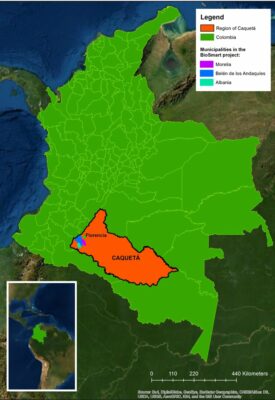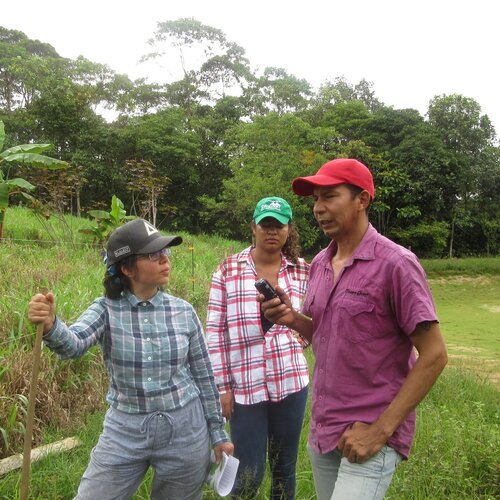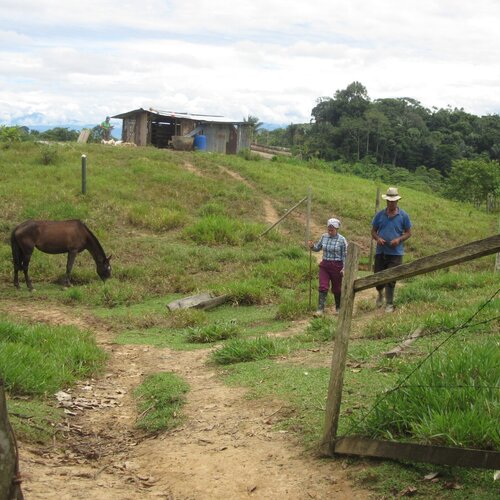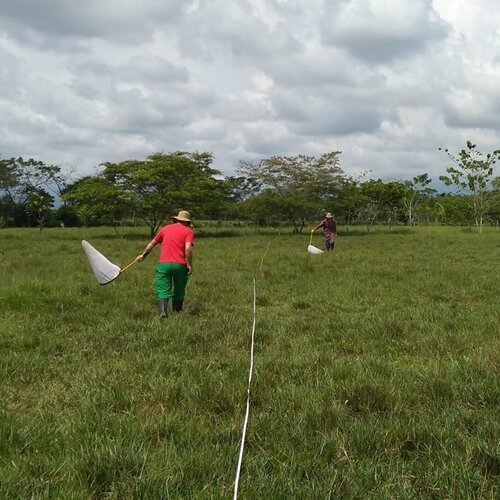About

Concept
Colombia is the second most biodiverse country in the world with a large rural population of small-holder, low income farmers. As the demand for meat and dairy increases, livestock farming continues to expand onto land that is not appropriate for farming, causing environmental damage through forest clearance, loss of biodiversity and land degradation.
Different national initiatives aim to encourage more intensive and sustainable farming that support farmers’ livelihoods and protect the environment and its rich biodiversity. Silvopastoral farming is one of those initiatives as it combines forestry and grazing. However, due to cultural and social factors, in combination with possible economic and agronomic influences, uptake remains low and deforestation continues.

BioSmart is a Newton Fund project that aims to explore and understand the reasons behind the low adoption of silvopastoral systems in Colombia. With an interdisciplinary approach, we build evidence to understand the cultural and economic context for the adoption of silvopastoral farming. We also study their ecological impact, in particular on plant and invertebrate biodiversity. After a pump-priming Phase I that focused on a small number of individual farms, we have scaled up our focus to a landscape level in Phase II.
Find out more about our different interdisciplinary methods, below.
Interdisciplinary
This interdisciplinary project brings together cultural geography, behavioural economics and ecological expertise from both the UK and Colombia to investigate institutional barriers as well as the socio-economic factors influencing the uptake of silvopastoral livestock farming practices that can support livelihoods and protect and enhance biodiversity.

Cultural Geography
We use the innovative methodology of Institutional Ethnography and combine research tools that include in-depth interviews, focus groups, participant observation and document analysis to investigate how agro-environmental projects, inclusive but not limited to silvopasture are organised, offered and implemented in the area.
Based on evidence from Phase I, our starting point is that low adoption of agro-environmental schemes including silvopastoral systems is too often explained as farmers’ failure, while the ways in which they are offered and implemented escapes detailed scrutiny. Our aim is to understand what that offer entails and how it works from the standpoint of farmers. We listen to farmers’ experience in order to improve the adoption and sustainability of these production systems.

Economics and Behaviours
We use a variety of approaches based on economic theory to understand the policy environment and how that may influence upscaling of these silvopastoral systems. We review policy influences which affect uptake, to assess the potential for policy interventions, including payments for ecosystems services, in dictating the level of uptake of silvopasture across the BioSmart regions of Colombia.
We examine farmer decision making, based on a large-scale survey (collected by CIAT) but also using on ground economic experiments, to understand the effect of fellow farmers behaviour and the balancing of risks and benefits from adopting silvopasture.
Finally, using spatial modelling to codify the effect of these influences on farmers across the region, we predict uptake levels and impacts on key SDG indicators for economic and environmental recovery, e.g. Greenhouse gas mitigation, sustainable and equitable incomes.

Ecology
BioSmart studies the ecological impacts of silvopastoral farming by investigating its impacts on biodiversity.
Through a large-scale field campaign we will quantify the scale-dependent benefits of silvopastoral practices and forest protection on biodiversity and ecosystem services to provide policy guidance at a landscape scale. This should identify optimal approaches to promote forest protection and silvopastoral implementation beyond just the individual farm.
We use a combination of botanical and invertebrate surveys to measure biodiversity across different habitat types within each farm in order to assess their conservation value.
Impact
BioSmart have identified the following communities who will be impacted by our work:
-
smallholder farmers currently adopting or wishing to adopt silvopastoral systems,
-
policymakers and other stakeholders interested in seeking ways to promote silvopastoral systems to increase resilience and enhance ecolosystems services in Colombian agricultural systems,
-
consumers of milk and dairy produce within Colombia.
With this in mind, we have organised activities and events in order to maximise outreach of our results:
-
Farmer workshops,
-
A symposium on The socio-ecological dynamics of tropical silvopastoral systems, to be held at the Association for Tropical Biology and Conservation’s annual meeting 2020 (postponed to 2022),
-
Scientific publications and other publication including web page and other literature in English and Spanish.
